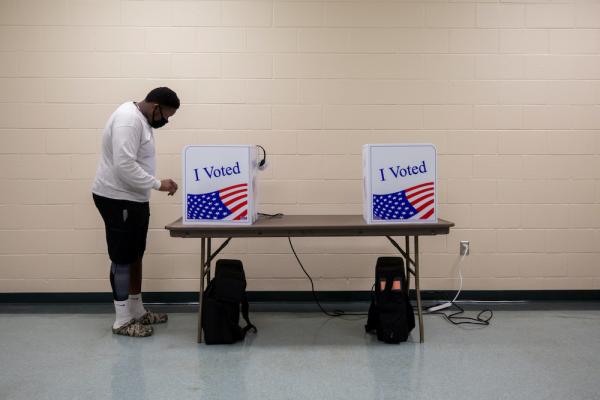Racism is on the ballot next week. Democracy is on the ballot next week. These things are inextricably linked because racism has disfigured American democracy from the founding of our nation. The road to a more perfect union has been long and uneven. And this road requires that we continually become a more perfect democracy and more just nation. While our democracy will never be perfect, we must continually defend the rights, institutions, and laws that help safeguard our freedoms and advance the common good. Increasingly, this election represents a test of whether we embrace and will work to realize a truly inclusive, multiracial democracy with liberty and justice for all.
A recent survey of independent experts for the Protect Democracy project indicated “substantial erosion” of American democracy, scoring the current threat to democracy at a 52 out of 100 (with 100 being “complete democratic breakdown”). In a recent Washington Post column, Richard Just put it plainly: "Whatever happens on Nov. 3 and in the days afterward, the biggest lesson of the past four years is that our collective commitment to democratic values needs, to put it mildly, some shoring up.” The Washington Post's editorial board has been regularly raising the alarm about the erosion of norms over the past few years, including "... commitment to democratic values, constitutional checks and balances, faith in reason and science, concern for Earth’s health, respect for public service, belief in civility and honest debate, being a beacon to refugees in need, aspirations to equality and diversity and basic decency."
It should also be of concern to all of us that extreme polarization and some of our nation's longstanding institutions have combined to make it harder than ever for the will of the people to be enacted. For example, gerrymandered districts in many states reward polarization and harm democracy. Ever since the Citizens United Supreme Court decision, corporate money has poured into political campaigns at an unprecedented pace. This past weekend, our country surpassed a new record of 80,000 new coronavirus infections in one day, which points to severe failures of leadership at every level. And this week’s confirmation of Supreme Court Justice Amy Coney Barrett through a purely partisan vote in the midst of such a consequential election undermines the credibility of our judicial branch.
Particularly during election seasons, the church grapples with what the Bible has to say about the role of governments. While our modern-day system of representative democracy was never fully practiced in biblical times, both the Old and New Testament offer core principles and purposes for government that can be applied to today. As Ron Sider summarized in Sojourners magazine in 2007, scripture shows that governments are called to “restrain evil and punish evil-doers” and to be a “servant for your good.” Sider goes on to say:
Fortunately, democratic societies implement the vision of limited government in numerous ways. These include the constitutional separation of powers (legislative, judicial, and administrative); the several, substantially independent spheres of national, regional, and local government; regular, free democratic elections; autonomous nongovernmental institutions; holding government officials accountable to the law; and freedom of speech, assembly, and dissent.
Free, fair, and safe elections represent the lifeblood of a healthy and vibrant democracy. Sadly, the right to vote has been hotly contested since our nation’s founding, when that right was only granted to land-owning white males. And it must be continually and relentlessly protected and defended. Voter suppression is like a mutated gene that has disfigured our democracy and propped up white supremacy from the beginning. Now the Republican Party seems addicted to a strategy of depressing turnout and making it more difficult for certain communities, particularly voters of color, to vote as a last-ditch way to hold onto power and win elections. This is not simply my opinion or conjecture. Their own strategists have admitted this is their deliberate strategy. The president has tweeted publicly that voting by mail will hurt Republicans. As a result, he continues to sow doubt and fear into the election, including with his bogus claim of voter fraud.
The real fraud is being orchestrated right now in states across the country through robocalls targeting Black and Latino voters; the calls are spreading conspiracy theories and seeking to depress turnout. It’s voter purges in states like Alabama. It's long lines and broken voting machines that just happen to be concentrated in communities of color. It’s the threat of voter intimidation and even violence. Yes, one person, one vote is a mirage if we are silent about and don’t actively resist these insidious tactics. Protecting every vote is and should be a nonpartisan cause and commitment. Protecting every vote is also a faith imperative. It’s a gospel and discipleship imperative. As we have been saying through our Lawyers and Collars and Turnout Sunday campaigns, it is an imago dei imperative.
That commitment must be realized through modernizing voter registration, enacting automatic voter registration, allowing same-day and online registration, protecting against flawed voter purges, restoring the Voting Rights Act, restoring voting rights to people with prior convictions, instituting nationwide early voting, and better protecting against deceptive practices. Revitalizing our democracy also requires more comprehensive campaign finance reforms like small donor public financing of elections, improving federal disclosure law, and overhauling the Federal Election Commission. Finally, we should support candidates who prioritize redistricting reform, greater election security, robust ethics reform, efforts to finally make the District of Columbia a state with voting representatives, and even ending the filibuster. Many of these are contained in HR 1 — which has been held up by Majority Leader Mitch McConnell — and in the now renamed the John Lewis Voting Rights Act, which should be one of the first orders of business for the newly elected Congress in January.
The presidential election may come down once again to Florida, the same state that determined the 2000 presidential election as a result of hanging chads. It is important to remember that the Florida recount initiated the Republican Party’s baseless accusations of voter fraud, which have only intensified over the past 20 years. If the president loses the election and refuses to relinquish power, or if enough suppression and/or electoral malfeasance takes place to alter the outcome, we will all need to ask ourselves: How much are we willing to sacrifice to defend our democracy?
Despite ongoing attempts to sow fear, doubt, and confusion in this election, there are encouraging signs of our nation’s determination and resilience. The images from across the country of over 80 million people who have waited in lines amid a pandemic to cast their early vote or dropped their ballots in the mail has been nothing short of inspirational. The Supreme Court rulings this week that allow for the states of Pennsylvania and North Carolina to count vote-by-mail ballots after the election are also very encouraging.
While there are many trends that are suffocating and undermining our democracy, our voice, our activism, and, at this critical moment, our vote represent both the antidote and the renewable resource for restoring and revitalizing our democracy. These are part and parcel of how we exercise our civic discipleship and uphold the biblical mandate to restrain evil and advance the common good.
Got something to say about what you're reading? We value your feedback!




